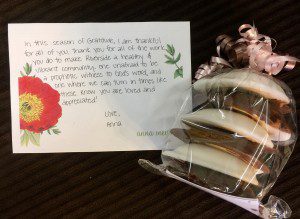Luke 1:68-79
 I don’t know how it was at YOUR house on Thanksgiving Day, but at my house growing up, Thanksgiving was one of those Norman Rockwell kinds of holidays . . . at least my Mom did her very best to make it seem so.
I don’t know how it was at YOUR house on Thanksgiving Day, but at my house growing up, Thanksgiving was one of those Norman Rockwell kinds of holidays . . . at least my Mom did her very best to make it seem so.
I remember my Mom getting up very early in the morning to put the turkey in, because it was likely we’d have a huge group and she was usually cooking the largest bird she could find. We’d all be pressed into service, ironing the table cloth, setting the table, bringing in the flower arrangements, polishing the silver, answering the door. Finally, when everything was ready and we were all assembled together, someone (typically Mom) would make some sort of Thanksgiving speech.
Usually it went like this:
“Today is Thanksgiving Day. This is a day that we remember all that God has given us and celebrate the fact that our lives are filled with good things. Before your father prays, everyone sitting around the table is invited to share one thing they are thankful for this year.”
From what I understand, this exercise is not limited to my family, as many of you do the same sort of thing at your house. But it must not be all that much fun, I got to thinking this week, if your life DOESN’T seem filled with good things . . . if you are having trouble thinking of what it is you might be thankful for this year.
In fact, come to think of it, all my years of Thanksgiving celebrations at my parents’ house, I have never heard anyone say (in response to my mother’s group exercise) anything like, “I have nothing to be thankful for this year” or “Can’t think of one thing . . . sorry.”
The reason for that, of course, is that we would never break decorum to say something like that, but the truth of the matter is that for some of us, at some time or another, devastation and heartbreak seem to be the defining characteristics of our lives, not overwhelming thankfulness. You know what I mean?
As I anticipate Thanksgiving this week with my family, I have to wonder how it will go down this year. Normally we can all overlook the sullen teenager in the group (just a phase!) or make pleasant conversation with the uncle that everyone despises (it’s just once a year!), but with the political and ideological divisions we’re experiencing up close and personal this year, I imagine that there may be some among us who are dreading family Thanksgiving this week…and not just because our candidate won or lost.
Around my table, anyway, there will be people who are now feeling that their very lives and safety are threatened. How will we sit around a table with people who think and vote in polar opposite ways? And worse, what does our own personal pain and internal division say about the dark, divided times in which we live? How will justice and peace come to be in a world where even Thanksgiving dinner is a reminder of all that is broken? What can save us?
Deep grief and separation from the community around them was the reality for Zechariah and Elizabeth after decades of married life in which they found themselves unable to have a family. And in addition to their personal pain, deep political conflict and division surrounded them in the Roman-occupied region of Galilee where they lived. All of these things were the backdrop for the beautiful song sung by Zechariah in the first chapter of Luke. Here’s the back story.
Zechariah was a priest who served in the temple, married to Elizabeth. They were righteous people, the text says, following all the rules. But Elizabeth was barren, unable to have children for their whole marriage long. And by now the years had gone by and they knew that their hopes were totally dashed—not a chance for a miracle to happen for them.
This was sad, of course, but in those days it was more than sad—it was devastating. Not only did not having children mean there was no one to take care of you in your old age; it also meant you’d been somehow cursed by God. Everyone felt sorry for you.
Well, one day Zechariah the priest showed up at the temple to work his shift and was going about his business, making sacrifices on behalf of the people he served, and an angel named Gabriel appeared to him. Shocked, Zechariah listened as the angel told him that his wife Elizabeth would conceive and bear a son named John, a prophet who would turn the hearts of the people toward God and toward each other.
Well, Zechariah was shocked. I mean, this wasn’t the first time in the story of the Jewish people that angels showed up promising babies, but you know, it’s not the kind of thing you ever really think is going to happen to you. For years they’d been married and unable to have children, so it seemed only reasonable for Zechariah to ask: “How can this happen? I’m old! Elizabeth is old!”
Seems like a reasonable question to me.
But Gabriel the angel was not amused. Maybe he was a little touchy because he was nervous about his next assignment—appearing to an unwed teenager to tell her she’d soon deliver the son of God. But in any case, the angel struck Zechariah dumb—he couldn’t talk.
When he came out of the temple unable to speak, the people of course knew that something big had happened, but they didn’t know what. For nine long months this would be the case for Zechariah, until his wife Elizabeth, who did in fact become pregnant, delivered a baby boy and they were headed to the temple to name him. Elizabeth insisted that he be named John, but her friends and neighbors told her that was against tradition—he had to be named for his father Zechariah. Still unable to speak, Zechariah wrote on a tablet an urgent message: the baby’s name will be John.
In that moment, Zechariah’s tongue was loosed, the text says, and Zechariah began to speak out loud.
And what he spoke was spoken in the language of blessing, a poem that narrated the eternal human cycle of remembering the promises of God, fulfilled; of finding ourselves in deep, deep despair and darkness once again; and of speaking with hope of what would surely save us.
Zechariah spoke both of history and future, of the times when God saved us from our enemies even though we thought it wasn’t possible, of the people who surrounded us, giving us the courage to serve God without fear even though we were crippled by fear most moments. And he spoke of messengers like his son John who would help us find our way again, help us remember that God is always waiting to forgive us and welcome us back into the persistent march toward justice and peace, toward the coming reign of God.
And then Zechariah said his final blessing, which must have had everyone in the crowd that day crying; “By the tender mercy of our God, the dawn from on high will break upon us, to give light to those who sit in darkness and the shadow of death, to guide our feet in the way of peace.”
The language of blessing that speaks of both history and future is what we are given this year on the edge of Thanksgiving week.
As we begin Advent next week, we’ll enter a whole season of waiting in the darkness, trying to live as if we believe that the light is coming to guide our feet in the way of peace. But today we have the song of Zechariah, beckoning us toward gratitude and relationship. Because he knew that the cyclical nature of human living would lead us again into darkness, and the only thing that would save us is remembering to turn our hearts toward God and toward each other.
If you’re anything like me, you’ve had trouble stomaching the news this week. It’s getting better, but every time I check Facebook or my NY Times alerts, I’ve been steeling myself for what I’ll read. What a surprise it was, then, to read a story this week about Phoenix teenager Jamal Hinton who got a text from a number he didn’t recognize. The text said something like, “Thanksgiving at my house? This is Grandma.”
Jamal was puzzled because he was pretty sure his Grandma did not know how to text. So he texted back, “Sure! And could you send a picture?” He suspected this might be a wrong number.
Wanda, the Grandma, had sent the text to her grandson, 24-year-old Brandon Burgoyne, who had recently gotten a new phone and changed numbers. Jamal now had Brandon’s number.
When Wanda sent her picture a few minutes later, that of a middle-aged white woman with long blond hair, Jamal sent back a picture of himself, a 17-year-old African American teenager. They both laughed and Jamal texted, jokingly, “Can I still get a plate, tho?”
Wanda replied, “Of course! That’s what grandmas do…feed everyone!”
A few days ago Wanda and Jamal met each other in person and are now friends in real life. Wanda is cooking Thanksgiving dinner; Jamal and his whole family are coming over to eat. They’re bringing dessert.
Wherever you’ll gather for Thanksgiving this year, I’m inviting you to follow the simple and powerful example of Zechariah and view your life, not through the circumstances that make it seem empty, but rather through the lens of God’s salvation, as it has been and as it will be.
Even if, when the question is asked around the dinner table, you can’t think of one single thing to be thankful for, the weight of your pain is so heavy, then turn to the one who can balance out the scales of utter inequity and lift your countenance from sadness to hope. Open your eyes now to see your life, filled to overflowing with the goodness and promise of God. And then open your heart to the richness of justice making community so that together we may move this world toward what God imagines for us.
For me, I know when the trouble and dissention and hopelessness and darkness threaten me this week, I will be thinking of you, of this community. I will be thinking of the voices of our children singing, “Don’t be afraid” last week after a week when I was more afraid than I’ve ever been. I will be thinking of the delicious cookies delivered to the office this week with a note from one of you for the staff that read: “I am thankful for all of you and the work you do to make Riverside a healthy and vibrant community, unafraid to be a prophetic witness.” I will be thinking of the mothers of this church, several of whom noticed I’d been sick and made sure I had nourishing food to eat during this stressful week. I will think of a member of this church, emailing to let me know she was safe after being arrested for protesting the Dakota pipeline, living her faith out loud and on behalf of us all. I will think of the new member who sat in my office this week talking about her first time taking communion here at Riverside, sitting in the pew unsure if she was welcome but being invited up to the front, recalling the experience with tears in her eyes and saying, “Thank you for making a place for me at the table.” I will think of our food pantry volunteers, who spent all day yesterday collecting almost $2000 of donations for the food pantry. I will think of all of you. Because this grace-filled, justice-making community helps me remember what will save us: turning toward God and toward each other, again and again.
Today I am so grateful that you help me remember:
“By the tender mercy of our God, the dawn from on high will break upon us, to give light to those who sit in darkness and in the shadow of death, to guide our feet into the way of peace.”
Amen.












